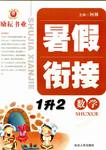题目内容
The manager believes prices will not rise by more than_____ four percent
A. any other B. another
C. the other D. other
练习册系列答案
 励耘书业暑假衔接宁波出版社系列答案
励耘书业暑假衔接宁波出版社系列答案
相关题目
题目内容
The manager believes prices will not rise by more than_____ four percent
A. any other B. another
C. the other D. other
 励耘书业暑假衔接宁波出版社系列答案
励耘书业暑假衔接宁波出版社系列答案